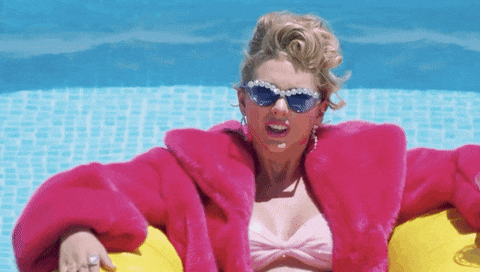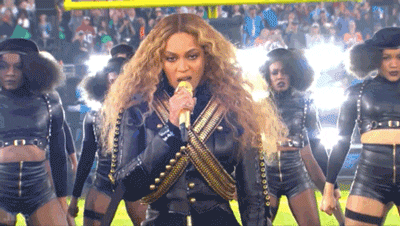You need to calm down: Political Commentary in Pop Music
New episode "Historical Criticism" show & tell out now!
You need to calm down, but we know it’ll be hard because in this episode, we are diving into historical criticism! We explore the context in which Taylor’s songs were created, starting with “Tim McGraw,” the first Taylor Swift single of all time. We then transition into the world of Lover with “Miss Americana and the Heartbreak Prince” and “You Need to Calm Down.” Join us as we explore how looking at the historical context of these songs helps deepen our understanding and appreciation of Taylor’s music!
🎧 Listen above and ⬇️ scroll below to read Maansi’s extra credit on whether current events and political commentary have a place in pop music.
🎥 Sneak Peek
Catch excerpts from the podcast and behind-the-scenes content on YouTube, TikTok, and Instagram!
🛍️ Shop With Us! Active Discount Codes
As we grow, we are so excited to announce new partnerships! Here you’ll find active discount codes available to our listeners.
📚 Bookshop.org Check out all our book recommendations by episode
🔉Libro.fm Support your local bookstore while listening to great audiobooks
Code: APTS
Offer: Get a free audiobook when you start a new membership (you must use this link!)
Receive 2 audiobook credits for $14.99 USD with your first month of membership.Code: APTS30
Offer: 30% off specific audiobooks in the AP Taylor Swift playlist.
✨ Krowned Krystals Make the whole place shimmer with the best rhinestones
Code: APTS
Offer: 10% off your order when you use the link above
📜 This Week’s Extra Credit by Maansi
Our episode on Historical Criticism aims to analyze Swift’s lyrics while acknowledging the historical context of when they were written and released. The idea is that paying attention to what was happening at that moment will give us a different read if that context is ignored. In this week’s episode, we discuss some of the events happening around the time she released “You Need to Calm Down” and “Miss Americana and the Heartbreak Prince” — what is undeniable about these songs is that they contain political commentary.
Taylor’s Lover era (2019) is when she first publicly aligns herself with the Democratic party, in both of the two songs we discussed, but also in the documentary that accompanied this album. It was a pretty bold departure from her strategy until that point, which involved her just saying clear of any political commentary at all. At a time when the country was going through polarizing politics, many felt that Taylor Swift, one of the biggest voices of the moment had been notably absent. But when she did finally speak out through her music, in many ways she added to that polarization. “You Need to Calm Down” was her firmly putting a flag down in the “I support LGBTQIA+ community” camp and it was met with uproar from the critics and big love from her supporters. Now her music was just one more thing that could be politicized. In these moments, there are always those who say artists should just stick to music and stay out of politics, which begs the question: What role does political commentary actually have in pop music?
The Intersection of Politics and Music
Before we dive into political commentary in pop music —let’s discuss political commentary through music. As a human race, song is an ancient tradition that has been a part of every culture for as long as we can tell. In ancient civilizations, songs were often how oral histories were passed down. During Medieval times in Europe, we’re familiar with the idea of a Bard who would document history through songs. We have nursery rhymes that exist today from the time of the Black Plague in Europe. We know songs to be an important part of the history of Slaves in America, especially as they sought freedom, songs were an important part of countries’ fights for freedom (I’ve never lived in India, but I grew up listening to anthems from the Indian fight for independence). And of course, every nation has a national anthem. The reason? Music has power. Music can mobilize people, can quite literally bring voices together, give people a rhythm to march to and inspire real change.
Intersection of Pop and Politics in History
To understand the answer to this question, we need to go back. Taylor Swift may be one of the largest pop stars to ever do it, but she is certainly not the first. “Pop music,” as we know it today, is an idea that dates back to the mid-1950s. The fact is, there’s been political commentary in pop music for a long time.
When searching for political anthems in music, some genres came up more often: Rock & Rap. Though the following songs were popular enough to be considered part of the pop lexicon of the time, their genres have perhaps been more forgiving of political commentary. Another thing I noticed was how many of these anthems were by male artists. Here are a few examples of what comes up:
Born in the USA, Bruce Springsteen → Anti Vietnam War
Imagine, John Lennon → Anti-war (esp religiously motivated)
Masters of War, Bob Dylan → Anti-war/Anti-weapons
American Idiot, Green Day → Commentary post-9/11 media frenzy
F*** tha Police, NWA → Protesting police brutality
So I decided to narrow my search to female artists. The way the [Dixie] Chicks’ Not Ready to Make Nice, which criticized the Bush administration during the Iraq war, essentially got them canceled at the time it was released, may hint at why there are fewer female pop political commentaries. While this song played across all major radio stations, it was technically considered to be more country music than pop, so I tried to find female pop artists in the most stereotypical, unimaginative definition of the genre (and I was admittedly surprised by how rare this is). Here’s what I came up with:
Born This Way, Lady Gaga → Creating space for LGBTQIA+ community
Rhythm Nation, Janet Jackson → Commenting on racial divides and the times
Stop the Madness, Whitney Houston → Anti-drug
Half-breed, Cher → Racism
Honorable mention from some male pop artists as well:
Man in the Mirror, Michael Jackson → Reacting to oppression/police brutality
Where is the Love, Black Eyed Peas → Anti-war, post 9/11 anxiety
Same Love, Macklemore → Supporting marriage equality
Seeing Pop Artists as Saviors
I would be remiss if I didn’t touch on one important negative consequence of political commentary in pop music. In the modern media age, the masses are enamored by pop stars (hello, I literally have a Taylor Swift podcast). We elevate them to the level of gods. This phenomenon is explored beautifully in The Age of Magical Overthinking, by Amanda Montell, which actually has a whole dedicated chapter on Taylor Swift. She writes that “people had always been overly worshipful—religion had forever been way too much, honor killings and all that— but now our gods weren’t imaginary figments painted as all-knowing and faultless; they were mortal human celebrities, who we knew for sure were not.”
She goes on to describe exchanges with Amy Long that reveal how “stans got pissed after Swift posted a few tweets condemning Donald Trump and police brutality, but she never took her political vocalizations any further. From the stans’ perspective, their idol had dangled a new era of progressive activism in front of them only to snatch it back, like a mother betraying a promise to her daughters.” She discusses what causes these bizarre expectations from celebrities who never promised or volunteered to be our heroes. I won’t get into it here, but it’s an important point to remember that while pop artists will often use their voice and music to comment wherever they feel necessary, an anthem is not the same as a commitment to save everyone and make everything alright. It’s an expression of the times, and nothing more.
Final Thoughts
Pop music by definition is music that spans the masses — it’s music that everyone can somehow relate to, it’s music that gets in people’s ears and continues to play over and over again. Given music’s power to unite and mobilize, it’s no wonder that people from opposing parties can feel threatened by political commentary entering into the medium. People will have you believe that music is meant to be enjoyed only and not serve any other purpose because then it becomes powerless. Fortunately, through time, there are artists like Taylor Swift who dare to face the wrath and give us music that realizes its full power potential— but they’re not saviors! It’s up to us to come together and wield the power that we are given through this music.








